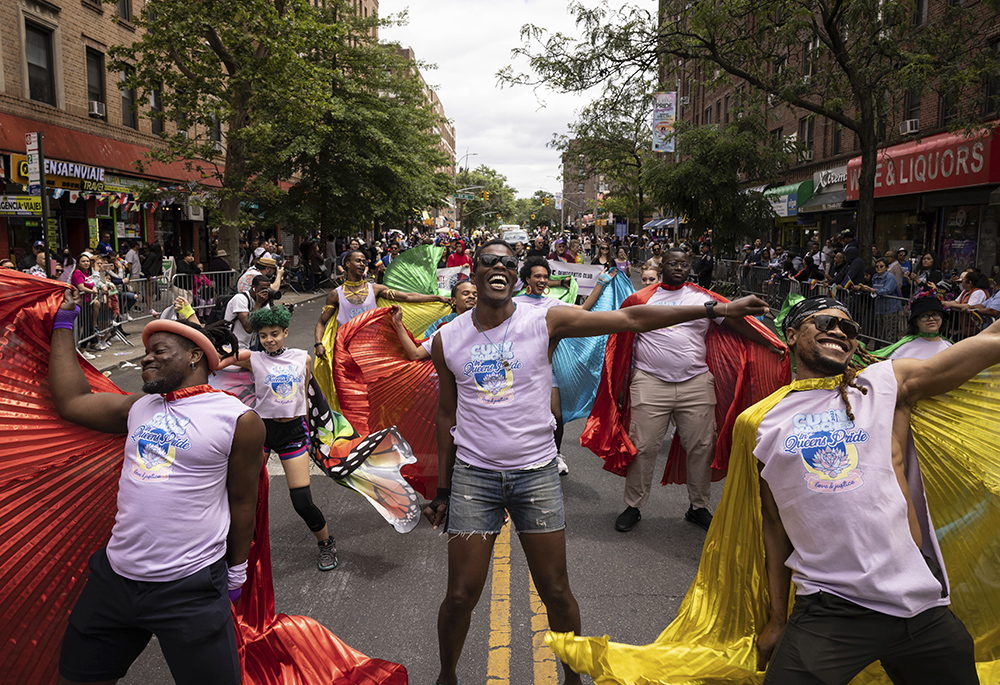
Performers march during the 31st annual Queens Pride Parade and Multicultural Festival June. 4, 2023, in New York. (AP photo/Yuki Iwamura)
I recently attended Queens Pride, the Pride parade in the New York borough of Queens. Queens is actually the largest borough in New York City by area, 109 square miles, and the second biggest by population at about 2.2 million. And yet what was most noticeable about the parade was its small-town feeling.
Rather than some kind of summer variation on Macy's Thanksgiving Day Parade, this was a Main Street USA-kind of affair, filled with LGBTQ marching bands, cheerleaders, street performers, politicians, community groups and even the Girl Scouts.
Pride parades have become a contentious issue in some quarters. In fact, just the idea of Pride is getting blasted by some these days as somehow offensive, including by some Catholics. I find that opposition so baffling. Who denounces a group for celebrating their community and its history, or for advocating for their civil rights? Could you imagine a city shutting down a St. Patrick's Day parade? A San Gennaro feast? The Puerto Rican Day parades which also occur in June across the nation? (Boricua de Corazón!)
Pride events commemorate the Stonewall riots which occurred in New York the weekend of June 28th, 1969, after the city's police arbitrarily raided a gay bar frequented largely by transgender people, homeless LGBTQ youth, and drag queens. When witnesses saw cops arresting people who had done nothing wrong, and then shoving and otherwise manhandling them, they became furious, throwing pennies and objects at the police and then at the bar after the officers retreated into it. For decades across the country, LGBTQ people had been dealing with the constant threat of the police harassing or attacking them. Stonewall was the moment they said no more.
Advertisement
The parades, which began a year after Stonewall, have always been partially about political advocacy for our rights. At a time when transgender people and drag queens find their rights being abridged — and when some states and churches are attempting to erase us from public discourse entirely — the need for this kind of visibility is enormous.
But watching people march joyously through downtown Queens, the thing that struck me most was how much the celebration of Pride emerges from an experience that is also at the heart of Christianity.
Most LGBTQ people have lived with a sense of shame about themselves as debilitating as any illness. Like Lazarus or Jesus, we've known what it is to exist in a tomb, in some cases for most of our lives, and then to have the stone miraculously rolled away and to be invited to walk into the light.
Like Lazarus or Jesus, we've known what it is to exist in a tomb, in some cases for most of our lives, and then to have the stone miraculously rolled away and to be invited to walk into the light.
Pride parades are in part an expression of the gratitude we feel to have been brought from that death into life. We have been given something we never knew was possible, and like the man born blind after he's healed by Jesus, we can't help but run out into the streets and give thanks.
Those who march do it for themselves, and also for all the other LGBTQ people out there who still feel trapped or ashamed, who don't know that there is the possibility of so much more for them. I can remember the first time I went to a Pride parade: It was in Manhattan, a huge production of float after massive float pumping out the beats. I was very nervous about going; what if someone I knew saw me there? They might realize I was gay. Even though I had been out to many friends for a long time, still the idea of being known was frightening.
And yet in retrospect all I remember from that day was the joy pouring off of the people dancing on the floats. It was so palpable you could just about see it radiating from them like the waves of heat that shimmer on the pavement in summer.
Those who march do it for themselves, and also for all the other LGBTQ people out there who still feel trapped or ashamed, who don't know that there is the possibility of so much more for them.
Queens Pride has been hosted for some years now by Marcus Woollen, a leader in the local queer community (and a friend), and drag icon Candy Samples, who performs regularly in Queens. Watching the parade, I was struck by how many people both marching and passing by made a point of stopping to say hello to Candy. It was the way they approached her — not like a celebrity, but with the kind of respect you show an elder. It turns out that's with good reason: For decades Samples has been an HIV/AIDS activist, including starting the CandyWrappers, a group that raises tens of thousands of dollars every year at AIDS Walk New York.
Samples has been performing as a drag queen for almost 30 years, and has released her own music, too. But she noted in 2016, "I think that as of late people know me more for fundraising." And she appreciated that: "That's fine! Isn't that great to be known for something good?"
She and others at Pride parades may not fit some people's expectations of the appearance of a saint. Then again, John the Baptist wandered around in animal skins eating locusts and Joan of Arc dressed in men's clothes. Being a saint is all about a willingness to take the leap of being who God calls you to be, regardless of how anyone else perceives it. And we look to our saints and celebrate them — often through exactly the same kinds of parties and parades we see at Pride — because their example and encouragement helps us to do the same.
Those who oppose Pride and Pride parades seem to be threatened by our existence, which again, is baffling. How do guys in heels, a nonbinary and trans drum corps, or the LGBTQ employees of Target pose a threat?
Jesus insisted that no one should ever hide our lights under a bushel basket. As the children's spiritual goes, "This little light of mine, I'm gonna let it shine." And if doing so can help others to see just what a miracle life can be, all the better.








